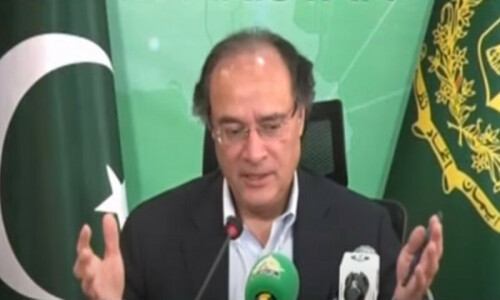Faced with an expected $20 billion external financing gap, Pakistan is desperate to attract as many forex inflows as possible in the new fiscal year, beginning July 1. However, its time-tested friend, China, isn’t willing to pour in new funds unless it ensures fool-proof security for Chinese projects and workers in Pakistan.
Furthermore, the US, with whom the country often enjoys a sweet and sour relationship, has started pressing for decisive actions against terror outfits operating from across Afghan borders. Saudi Arabia and the UAE, two other friendly countries, are also eager to see visible improvement in the country’s security environment.
All four countries want guarantees regarding the continuation of foreign investment policies before they pump any more state funds into Pakistan’s economy or convince their private sectors to invest in lucrative projects related to the country’s agriculture, infrastructure, energy, mining and information technology sectors.
The US also wants to see more inclusive democracy in Pakistan, while China wants to ensure that the policies of the present hybrid regime are owned by all political parties. That is why we see the hybrid regime accelerate their efforts to do whatever they can to accommodate the many common requirements of these four countries into policies and actions.
The government is focused on preserving support from abroad while failing to address underlying reasons for the expanding balance of payments deficit
Keeping the US onboard is necessary to brighten the chances for enough funding from the International Monetary Fund (IMF) and winning the hearts of Chinese leadership is important to unlock the second phase of the China-Pakistan Economic Corridor.
Similarly, maintaining good relationships with Saudi Arabia and the United Arab Emirates is a must to rely on their ‘generosity’ at times of foreign exchange crisis. Both have proven track records of saving Pakistan from sovereign default by placing billions of dollars worth of funds into the State Bank’s account and rolling them over when necessary.
If one keeps this perspective in mind, it becomes easier to understand every move the current leadership is making for forging political unity, going as far as suggesting that terror outfits operating from Afghanistan can be targeted even inside the country. Pakistan’s Defence Minister Khawaja Asif recently said if that happens, it will not be a violation of international law.
Beyond that, Prime Minister Shahbaz Sharif has also reiterated his efforts to talk to Imran Khan to create the political stability required to take the country out of crisis.
During the week ended on June 24, Pakistan’s central bank had just $8.9bn foreign exchange reserves, insufficient to cover two months of goods’ import bills following repatriation in May and dividends of $918 million earned by foreign companies in Pakistan.
This massive outflow cleared a backlog accumulated over several quarters. The move will help negotiate a new IMF programme supporting balance of payments (BoP) besides signalling to foreign investors that it is easier now to repatriate profits and dividends from Pakistan.
The federal budget for FY25 ignores some of the IMF’s demands, including those regarding government employees’ pay and pensions and the pace of subsidy withdrawals from the energy and food sectors. But government officials hope that they will eventually secure at least $7bn via fresh IMF financing by the end of September — though no such hint has been given, the authorities remain engaged in discussions.
The first quarter of the new fiscal year, July-September 2024, would likely test Pakistan’s ability to manage its external account. Even if a new IMF loan is approved by September, the first tranche of the loan will either come towards the end of the month or early October. This means Pakistan will have to make all external debt payments on its own at a time when the trade deficit is likely expand. All eyes will, therefore, remain fixed on foreign exchange rates.
State Bank of Pakistan data reveals that on June 27 this year, the rupee closed at Rs278.37 in the interbank market, a marked improvement from Rs285.99 a year earlier. However, it is very difficult to say whether this trend continues through July-September.
Between July 2023 and May 2024, Pakistan booked a massive $21.82bn trade deficit in goods and services. Luckily, home remittances of $27.1bn during this period exceeded the overall trade deficit and helped keep the current account deficit at a manageable level of just $464m in July-May of the last fiscal year.
However, regardless of this lowly current account deficit, Pakistan’s overall BoP remained negative by $2.45bn, despite IMF lending $3bn topped by roll-overs of billions of funds placed in the country’s account by China, Saudi Arabia and the UAE.
If the exchange rates remain stable (as we saw in FY24) amidst a large BoP deficit but a low current account deficit, it will indicate the gathering storm around the fundamentals of the exchange rates. A low current account deficit (in our case obtained primarily through stifling imports) may embolden authorities to keep the local currency stable for a while, ignoring the expanding BoP deficit.
Unfortunately, that is not how the external economy works. A sustained BoP deficit must be reflected in the exchange rate after some time; that time has come for us. During FY25, the rupee is bound to lose its value unless the underlying reasons for the BoP deficit are addressed. It is also bound to reflect in current account deficit unless exports’ growth does not outpace imports’ growth, and remittances also grow simultaneously to compensate for the volumetric rise in imports.
Published in Dawn, The Business and Finance Weekly, July 1st, 2024















































Dear visitor, the comments section is undergoing an overhaul and will return soon.